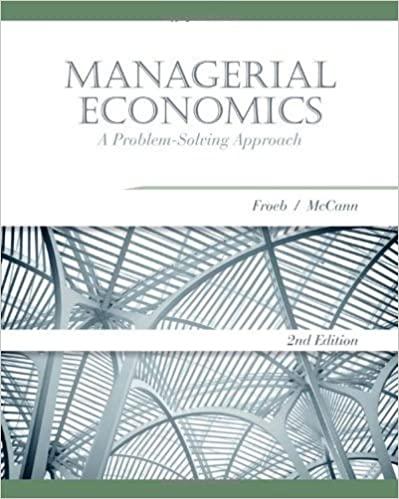Question
How would you reply to this post? This is not the post this is just the overview In Unit 4, we discussed international trade in
How would you reply to this post?
This is not the post this is just the overview
In Unit 4, we discussed international trade in Chapter 9. Look at the latest Trade Report from the Bureau of Economic Analysis in the Reading and Resources section.
https://www.bea.gov/news/2024/us-international-trade-goods-and-services-may-2024
- What was the value of goods and services we exported and imported in the latest report?
- Did the US have a trade deficit, surplus, or balanced trade?
- Based on your research, what caused the trend over the last year?
- If you were to argue in favor of restricting trade, which are some of the industries or sectors you would restrict, and what arguments would you make to support your case
BELOW IS THE POST I NEED TO REPLY TO
As I examine the values of goods and services that the US has exported and imported, I'm focusing on understanding whether we're facing a trade deficit, surplus, or balanced trade situation. A trade deficit occurs when our imports exceed our exports, signaling that we're purchasing more from other countries than we're selling. Conversely, a trade surplus means we're exporting more than we're importing, which reflects strength in our international trade relationships. A balanced trade, of course, occurs when exports and imports are equal.
Over the past year, I've observed that international trade trends have been shaped by numerous factors. Changes in global demand, fluctuations in currency exchange rates, geopolitical events affecting trade relations, and even our own domestic economic policies all contribute significantly. For instance, shifts in consumer preferences towards imported goods or adjustments in trade agreements can greatly impact our trade balance.
When I think about industries that might be adversely affected by international competition, I see a strong case for implementing trade restrictions. Industries facing intense competition from cheaper imports often argue for protective measures to shield domestic jobs and production capabilities. They might highlight issues like unfair trade practices such as dumping, where foreign products are sold at artificially low prices, or subsidies that give foreign competitors an unfair advantage. Concerns about differing environmental and labor standards between countries also factor into these arguments, as they can create uneven playing fields for domestic producers.
Specifically, sectors like manufacturingespecially those involved in steel, automobiles, textiles, and other critical goodsfrequently advocate for trade restrictions. They emphasize the need to preserve domestic jobs and ensure economic security. Additionally, arguments for restricting trade often underscore national security implications, arguing that relying too heavily on foreign suppliers for essential goods could compromise our sovereignty and resilience in times of crisis.
In conclusion, while international trade offers undeniable benefits such as market access and economic growth opportunities, my focus on advocating for trade restrictions is rooted in safeguarding our domestic industries, preserving jobs, and protecting our national interests. These concerns arise from real threats posed by international competition and underscore the broader implications of maintaining a balanced and fair trade environment for the US economy.
Step by Step Solution
There are 3 Steps involved in it
Step: 1

Get Instant Access to Expert-Tailored Solutions
See step-by-step solutions with expert insights and AI powered tools for academic success
Step: 2

Step: 3

Ace Your Homework with AI
Get the answers you need in no time with our AI-driven, step-by-step assistance
Get Started


